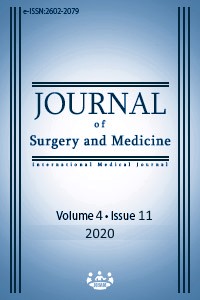Comparison of blood culture results and clinical biochemistry laboratory parameters in geriatric patients with regards to infective agents
Keywords:
bacteremia, elderly, procalcitoninAbstract
Aim: Bacterial infections can cause life-threatening sepsis and should be identified and managed accurately, especially in the elderly. We aim to examine the relationships between positive blood cultures, Gram staining pattern and biochemistry parameters, in particular, procalcitonin (ProCT) levels. Methods: This was a single center retrospective study, in which patients with positive blood cultures detected in Maltepe University Faculty of Medicine Research and Education Hospital were included. Two groups were formed according to age and evaluated with regards to bacterial Gram staining and biochemistry laboratory findings. Group 1 consisted of patients under 65 years of age (n=69) and Group 2 included those over 65 years of age (n=198). Results: Two hundred and sixty-seven episodes of bacteremia (Gram-negative: 49.43%, Gram-positive bacteremia: 50.56%) were evaluated in two groups. CRP values, lymphocyte and thrombocyte counts, creatinine, AST, ALT, albumin, CRP/albumin ratio values were similar between two groups (P>0.05 for all), while leukocyte counts, neutrophil counts and BUN values were lower in group 1 (P=0.020, P=0.020 and P<0.001 respectively) and ProCT levels were lower in group 2 (P=0.049). ProCT values (independent of age) had significantly increased in patients with Gram-negative bacteremia (P<0.001 in both group 1 and 2). Conclusion: ProCT measurement can be helpful as a distinguishing biomarker in different bloodstream infections, regardless of age.
Downloads
References
Hallworth MJ. That ‘70%’ claim again…. Annals of clinical biochemistry. 2018;55(4):517-8.
Sitar ME, Ipek BO, Karadeniz A. Procalcitonin in the diagnosis of sepsis and correlations with upcoming novel diagnostic markers. Int J Med Biochem. 2019;2(3):132-40.
Assicot M, Gendrel D, Carsin H, Raymond J, Guilbaud J, Bohuon C. High serum procalcitonin concentrations in patients with sepsis and infection. Lancet (London, England). 1993;341(8844):515-8.
Meisner M. Update on procalcitonin measurements. Annals of laboratory medicine. 2014;34(4):263-73. Epub 2014/07/02. doi: 10.3343/alm.2014.34.4.263.
Eddy F, Joyce A, Dryden M, Saeed K. Procalcitonin in Older Patients; Promoting Antibiotic Stewardship in Complex Patients. J Infect Non Infect Dis. 2015;1(002).
Vásárhelyi B, Debreczeni LA. Lab Test Findings in the Elderly. EJIFCC. 2017;28(4):328-32.
Charles PE, Ladoire S, Aho S, Quenot J-P, Doise J-M, Prin S, et al. Serum procalcitonin elevation in critically ill patients at the onset of bacteremia caused by either Gram negative or Gram positive bacteria. BMC infectious diseases. 2008;8(1):38.
Yan ST, Sun LC, Jia HB, Gao W, Yang JP, Zhang GQ. Procalcitonin levels in bloodstream infections caused by different sources and species of bacteria. The American journal of emergency medicine. 2017;35(4):579-83.
Friend KE, Burgess JN, Britt RC, Collins JN, Weireter LN, Novosel TJ, et al. Procalcitonin elevation suggests a septic source. The American Surgeon. 2014;80(9):906-9.
Lai L, Lai Y, Wang H, Peng L, Zhou N, Tian Y, et al. Diagnostic Accuracy of Procalcitonin Compared to C-Reactive Protein and Interleukin 6 in Recognizing Gram-Negative Bloodstream Infection: A Meta-Analytic Study. Disease markers. 2020;2020.
Stucker F, Herrmann F, Graf JD, Michel JP, Krause KH, Gavazzi G. Procalcitonin and infection in elderly patients. Journal of the American Geriatrics Society. 2005;53(8):1392-5.
Lai CC, Chen SY, Wang CY, Wang JY, Su CP, Liao CH, et al. Diagnostic value of procalcitonin for bacterial infection in elderly patients in the emergency department. Journal of the American Geriatrics Society. 2010;58(3):518-22.
Talebi-Taher M, Babazadeh S, Barati M, Latifnia M. Serum inflammatory markers in the elderly: are they useful in differentiating sepsis from SIRS? Acta Medica Iranica. 2014:438-42.
Klee GG, Westgard JO. Quality management. Tietz Fundamentals of Clinical Chemistry and Molecular Diagnostics-E-Book.90.
Kul S. Uygun Istatistiksel Test Seçim Kılavuzu/Guideline For Suitable Statistical Test Selection. Plevra Bülteni. 2014;8(2):26.
Arabacı Ç, Kutlu O. Evaluation of microorganisms isolated from blood cultures and their susceptibility profiles to antibiotics in five years period. Journal of Surgery and Medicine. 2019;3(10):729-33.
Demirbakan H, Dağlar D, Yıldırım Ç, Öztürk F, Öngüt G, Yaman M, et al. Kan kültürlerinden izole edilen bakteriler ve antibiyotiklere duyarlılıkları. Türk Mikrobiyol Cem Derg. 2005;35(3):183-8.
Daskalaki E, Koukoulaki M, Bakalis A, Papastamopoulos V, Belesiotou E, Perivolioti E, et al. Blood stream infections in renal transplant recipients: a single-center study. Transplantation proceedings. 2014;46(9):3191-3. Epub 2014/11/26. doi: 10.1016/j.transproceed.2014.10.033.
Prabhash K, Medhekar A, Ghadyalpatil N, Noronha V, Biswas S, Kurkure P, et al. Blood stream infections in cancer patients: a single center experience of isolates and sensitivity pattern. Indian journal of cancer. 2010;47(2):184-8. Epub 2010/05/08. doi: 10.4103/0019-509x.63019.
Li S, Rong H, Guo Q, Chen Y, Zhang G, Yang J. Serum procalcitonin levels distinguish Gram-negative bacterial sepsis from Gram-positive bacterial and fungal sepsis. J Res Med Sci. 2016;21:39-. doi: 10.4103/1735-1995.183996.
Lin J-C, Chen Z-H, Chen X-D. Elevated serum procalcitonin predicts Gram-negative bloodstream infections in patients with burns. Burns. 2020;46(1):182-9.
Wang D, Tao X, Guo W, Liu H, Cheng S, Wang J. The diagnostic ability of procalcitonin to differentiate Gram-negative bacteria from Gram-positive bacteria and fungal bloodstream infections in critically ill patients. European Journal of Inflammation. 2019;17:2058739219841469.
Liu H, Zhang M, Guo J, Li J, Su L. Procalcitonin and C-reactive protein in early diagnosis of sepsis caused by either Gram-negative or Gram-positive bacteria. Irish Journal of Medical Science (1971-). 2017;186(1):207-12.
Bilgili B, Haliloglu M, Aslan MS, Sayan I, Kasapoglu US, Cinel I. Prokalsitoninin Bakteriyemik Gram Negatif Sepisisin Gram Pozitif Sepsisten Ayrımında Tanısal Doğruluğu/Diagnostic Accuracy of Procalcitonin for Differentiating Bacteraemic Gram-Negative Sepsis from Gram-Positive Sepsis. Turkish Journal of Anaesthesiology and Reanimation. 2018;46(1):38-44.
Downloads
- 634 966
Published
Issue
Section
How to Cite
License
Copyright (c) 2020 Aslı Karadeniz, Mustafa Erinç Sitar, Belkız Öngen
This work is licensed under a Creative Commons Attribution-NonCommercial-NoDerivatives 4.0 International License.
















